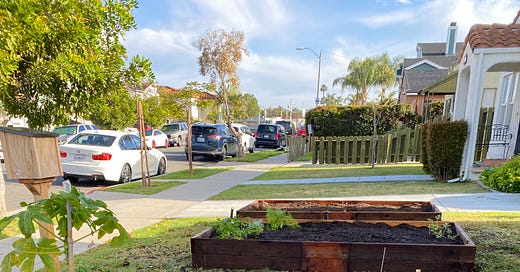Photo: Michele Bigley
Nikko tucked the watermelon seedling into the dirt and announced, “We’ll call it the People’s Garden.” I thought of all the people who pass our front lawn every day—the young woman with the straight back leading her doberman pincher around the block on a short leash, the older biracial couple who joked that I probably shouldn’t bury my husband in my new raised beds, the ex-military vegans who couldn’t bear to kill resident rodents around their property and instead took them to the desert to run free, the former chaplain kindly guiding her diabetic blind dog around the block.
“Yeah,” I said, tossing some compost into the clay dirt, and hoping that this former dried grass patch called a lawn would one day feed someone. “I like that name. The People’s Garden it is.”
Today’s Earth Day.
In my UCSC writing classes, our climate coalition is doing in a teach-in (check out this interview I did with awesome plastic pollution activist Jackie Nunez). The cross-campus UC community is participating in a rally for campuses to divorce from fossil fuels. There are Earth Day parties, protests, plantings, educational series, and more across the planet. But in real time today, I’m putting the finishing touches on my community garden.
When I told my neighbors that I was building a community garden in my front lawn, they looked at me like I’d just dropped acid with Kai and Nikko. “But someone will take your food,” the woman at the corner muttered, shaking her head and saying she didn’t understand us Northern California hippies. I smiled and said we’d probably have peaches and papaya growing within a couple years. But I would have some berries and melons available this year. She shook his head again and wished me luck.
My first day assembling the raised beds and hauling in truckloads of dirt, the horticulturist across the street and the retired chaplain next door laughed at my ignorance. They called me a city girl when I explained that I didn’t know you had to water your compost. “Do you know you need to turn it?” one of them chuckled.
By day two, as I was digging giant holes in the clay dirt and amending it with gypsum (a trick learned from California’s most successful coffee grower Jay Ruskey), they came by and started helping. The horticulturist knelt into the soil to pull out an old root, clear away invasive grasses, and nurture my passion fruit and lime trees with compost. The chaplain offered wisdom about permaculture techniques she’d learned from growing up on a farm. Though she just called her techniques common sense.
On day three, the woman with the doberman complimented the herbs lining the walkway, talking to me for the first time in a year and a half of being neighbors. When I told her to take whatever she wanted, that it’s planted for us all, she looked at me quizzically, but not without a new hint of interest. The ex-military couple offered seeds. The kids a couple houses down are going to help Nikko paint signs. And today, my realtor is coming by to bring the seedlings she started for us.
Celebrating what nature offers
Growing for your community is not some new hippie trend—though in cities like Pittsburgh local activists are planting urban gardens at open lots, along sidewalks and on rooftops for the taking. Offering our bounty to our neighbors helps us all survive. If my neighbor is hungry, they can’t look out for anyone but themselves.
But the real reasons I am creating a little free garden in my front yard is to make an offering to the Earth. When I tend to my garden, I am not just feeding people, but also the countless species that rely on this land to survive. The flock of sparrows and crows that peck at the dirt each morning. The hummingbirds, butterflies, bees and worms. The cats and rats and possums and skunks that arrive every so often. This was their home first. I respect that, so I plant more so we are all nourished. In doing this, I celebrate and honor what nature can offer. And, I build community in the process.
Yesterday while I was planting chamomile and valerian, the chaplain and horticulturist came by. The chaplain whistled, “Looks good.” She cocked her head toward her lawn. “Maybe I’ll start a garden too in my front yard.”
The horticulturist nodded and said, “I’m doing my neighbor’s garden. I’m going to put in a bunch of flowers to bring in pollinators for all this food.”
This week’s challenge
Friends, this week, I ask you to simply plant something in a public place that will become food. This can be a container on your stoop, a pumpkin seed in an abandoned lot, some mint in a patch of dirt. Share what you have with more than just your clan. Plant a seed and let to grow for someone else.
Until next time…
~Michele





